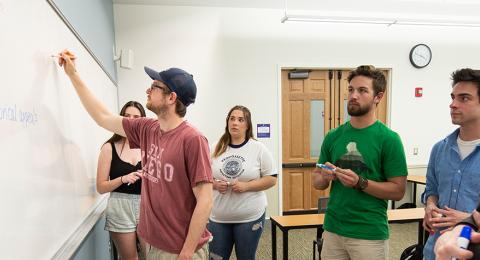The English Teaching major at UNH will prepare you to teach middle- or high-school level English. At UNH, students gain hands-on experience through a yearlong teaching internship and can pursue opportunities in teaching English as a second language, primary and secondary education, and writing. The program includes an optional fifth year for a master's degree and an internship, fulfilling New Hampshire's teaching certification requirements, which also qualifies teachers to work in several other states.
What is English teaching?
Do you enjoy working with young adults? Do you love to share your enthusiasm for literature? Do you like to help others with their writing? If so, consider becoming an English teacher. This program will prepare you to teach middle- or high-school level English. You’ll study English literature and grammar, human development and learning, the education system and teaching practices. In your senior year, you’ll be able to apply for a fifth year of study and internship to fulfill New Hampshire’s teaching certification requirements.
Why study English teaching at UNH?
master’s program in the Education Department and applying for New Hampshire teacher certification. Students who choose one of these programs will complete graduate-level coursework and undertake a yearlong teaching internship where they will collaborate with a teacher to apply their knowledge in a classroom. As a certified teacher in New Hampshire, you’ll also be qualified to teach in several other states. You’ll find inspiration through a variety of local programs offering opportunities to get involved with teaching English as a second language, primary and secondary education, and writing.
Potential careers
- Adult education teacher
- English teacher
- ESL program coordinator
- Principal
- Writer
Curriculum & Requirements
Are you passionate about serving your community? Do you enjoy reading, writing, creative thinking and imagination? Are you eager to shape the future? The English teaching major could be a wonderful choice for you!
English teaching majors synthesize knowledge across areas — literature, language, composition, speaking, listening, identity, linguistics and education, just to name a few. We think critically and collaborate. We spark learning and we study it. We evaluate texts and resources, examine literacy skills, consider appropriate media, and design reading and writing opportunities and instruction in a variety of contexts. In particular, the English teaching major focuses on preparing future teachers and educational leaders, but the skills students learn are valuable in many settings, from the classroom to the workplace to the broader world.
The goal of the English teaching major is to prepare informed, thoughtful, and skilled English teachers who will become educational leaders in their own communities and in the teaching profession. In the English Department, students learn about literature, cultural theories of race and identity, composition, grammar, a variety of textual and digital media, and instructional practices appropriate to grades five through twelve. In the Education Department, students learn about human development, the history of schooling, and many philosophical perspectives on learning and education.
The final steps to becoming a teacher are completing a Master’s program in the Education Department and applying for New Hampshire teacher certification. Students who choose one of these programs will complete graduate-level coursework and undertake a year-long teaching internship where they will collaborate with a teacher to apply their knowledge in a classroom. Students who complete this program are uniquely well prepared to become leaders in the profession over the long term. State certification is transferable to most other states, and, after five years, 88.7% of UNH master’s program graduates report that they are teaching or employed in an education-related job. Join the English teaching major and turn your passion for English into a fulfilling career serving your community!
Students interested in majoring in English teaching should consult Carla Cannizzaro, Senior Academic Advisor, Department of English, 230F Hamilton Smith Hall, (603) 862-1313, or the director of the English teaching program, Prof. Alecia Magnifico.
Sample Degree Plan
This sample degree plan serves as a general guide; students collaborate with their academic advisor to develop a personalized degree plan to meet their academic goals and program requirements.
| First Year | ||
|---|---|---|
| Fall | Credits | |
| ENGL 401 | First-Year Writing 1 | 4 |
| Language Course | 4 | |
| Discovery Course | 4 | |
| Discovery Course or Major Course | 4 | |
| COLA 401A: First Year Seminar | 1 | |
| Credits | 17 | |
| Spring | ||
| ENGL 419 | How to Read Anything | 4 |
| Language Course | 4 | |
| Discovery Course | 4 | |
| Major Elective Course | 4 | |
| Credits | 16 | |
| Second Year | ||
| Fall | ||
| Major Elective Course | 4 | |
| Major Elective Course | 4 | |
| Discovery Course | 4 | |
| EDUC 500 | Exploring Teaching (or Major/Minor/Discovery Course) | 4 |
| Credits | 16 | |
| Spring | ||
| Major Elective Course | 4 | |
| Major Elective Course | 4 | |
| Discovery Course | 4 | |
| EDUC 500 | Exploring Teaching (or Major/Minor/Discovery Course) | 4 |
| Credits | 16 | |
| Third Year | ||
| Fall | ||
| ENGL 725 | Teaching Writing: Seminar in English Teaching | 4 |
| ENGL 791 | English Grammar (or Major Elective Course) | 4 |
| Discovery Course | 4 | |
| Major/Minor/Discovery Course | 4 | |
| Credits | 16 | |
| Spring | ||
| ENGL 726 | Teaching Literature and Literacy: Seminar in English Teaching (or Major Elective Course) | 4 |
| ENGL 791 | English Grammar (or Major Elective Course) | 4 |
| Discovery Course | 4 | |
| Major/Minor/Discovery Course | 4 | |
| Credits | 16 | |
| Fourth Year | ||
| Fall | ||
| ENGL 789 | Special Topics in English Teaching (Capstone or Major Elective Course) | 4 |
| Major Elective Course | 4 | |
| Elective Course | 4 | |
| Elective Course | 4 | |
| Credits | 16 | |
| Spring | ||
| ENGL 789 | Special Topics in English Teaching (Capstone or Major Elective Course) | 4 |
| Elective Course | 4 | |
| Elective Course | 4 | |
| Elective Course | 4 | |
| Credits | 16 | |
| Total Credits | 129 | |
- 1
Students who successfully apply AP or Transfer Credits towards the ENGL 401 ‘First Year Writing’ requirement may enroll in ENGL 419 during their first semester.
Degree Requirements
All Major, Option and Elective Requirements as indicated.
*Major GPA requirements as indicated.
Major Requirements
- Completion of the undergraduate teaching major does not in itself meet state certification requirements.
- Students should enroll in the undergraduate major and pass the following courses with a GPA of 2.5 or better.
- English teaching majors may use one major-required course to satisfy one Discovery category requirement.
- Majors may only count one online course towards the English major requirements.
| Code | Title | Credits |
|---|---|---|
| Required Courses | ||
| ENGL 419 | How to Read Anything | 4 |
| ENGL 514W | British Literature III: Revolts, Renewals, Migrations | 4 |
| ENGL 516W | American Literature II Money, Migration, and Modernity: Huck Finn to Beloved | 4 |
| ENGL 657 | Shakespeare | 4 |
| ENGL 725 & ENGL 726 | Teaching Writing: Seminar in English Teaching and Teaching Literature and Literacy: Seminar in English Teaching | 8 |
| or ENGL 710 & ENGL 792 | Teaching Writing and Teaching Literature and Literacy | |
| ENGL 791 | English Grammar | 4 |
| EDUC 500 | Exploring Teaching | 4 |
| Select two additional literature courses at the 600-level or above. 1 | 8 | |
| Select one course from the Community and Cultures course list below. 2 | 4 | |
| Select one additional ENGL Department course in writing, linguistics, critical theory, film, or literature. 3 | 4 | |
| Capstone | ||
| ENGL 789 | Special Topics in English Teaching | 4 |
| Total Credits | 52 | |
| Code | Title | Credits |
|---|---|---|
| Community and Cultures Courses | ||
| Select from the following: | ||
ENGL 440A | Honors/On Race in Culture and Society | |
ENGL 550 | Introduction to the Literature and Culture of Race | |
ENGL 650R | I Hear America Singing: Studying American Literature and Culture | |
ENGL 693 | Special Topics in Literature (subtopic R) | |
ENGL 693R | Special Topics in Literature | |
ENGL 738 | Asian American Studies | |
ENGL 778 | Race and Gender in Film and Popular Culture | |
ENGL 797R | Special Studies in Literature (Race & Racial Theories) | |
- 1
ENGL 512 or ENGL 513W may be substituted for one of the two required literature courses numbered 600 or above.
- 2
Other relevant courses may count with prior written approval of the student's advisor. The course used to fulfill this requirement may be double counted within the ‘Two literature courses 600 or above’ OR ‘Additional ENGL Department course…’ requirement area.
- 3
ENGL 401, ENGL 415, and ENGL 444 may not be used to fulfill this requirement.
Additional Information
English teaching majors should apply for the fifth-year teaching internship and master's degree program by fall or spring of the senior year (usually September 30 for the internship and November 1 or February 1 for the master's program). Students with a GPA of 3.2 or better can apply for the master's degree program in their junior year. If accepted early, the student can earn graduate credit for up to three undergraduate English or education courses.
Program Learning Outcomes
Students will have the opportunity to compare philosophies of English teaching and learning, and to develop their own approaches to writing and literacy instruction in unit plans and lesson plans. In class, we will discuss theoretical and pedagogical ideas centered on student writing, engage in reading and writing exercises, produce and practice instructional activities and assessments, evaluate approaches to teaching writing, and review state-level standards and tests. Overall, the aim of the course is recognition of literacy skills (including reading, writing, listening, speaking, and viewing) and consideration of how they can be used for learning goals including comprehension, analysis, description, and evaluation.
Students will:
- Design activities, lessons, and units to meet established standards and objectives in writing and language use.
- Adapt materials for a variety of students’ needs, including exceptional learners.
- Identify teaching resources among mentors, professional literature, conferences, organizations (e.g., National Council of Teachers of English [NCTE]), technology, and websites.
- Reflect and write on the theoretical bases for instructional decisions, evaluating professional literature and using appropriate academic conventions.
- Deliver engaging, on-point writing and language instruction appropriate to audience and content; practice a variety of presentation and discussion strategies.






